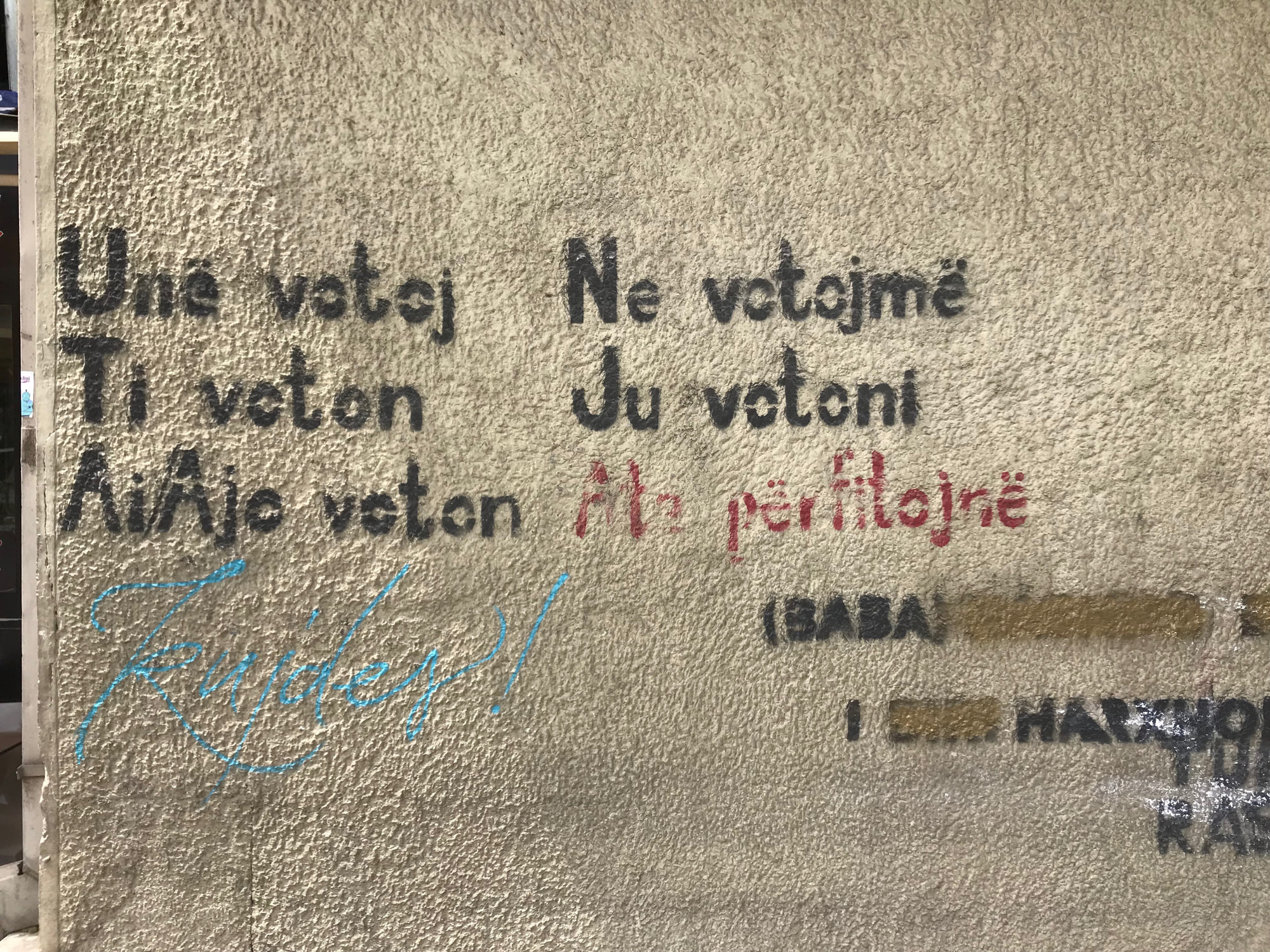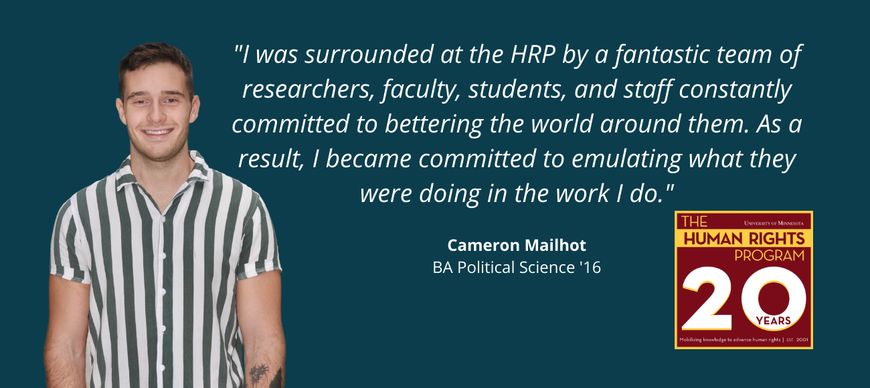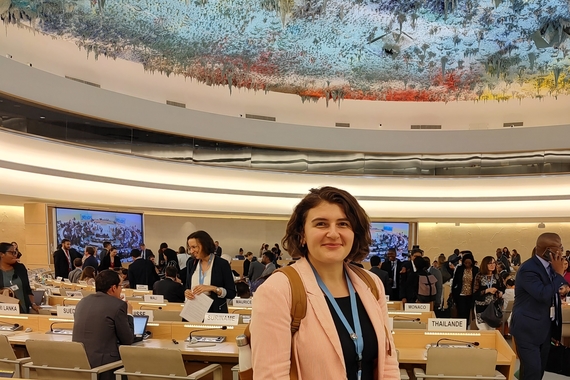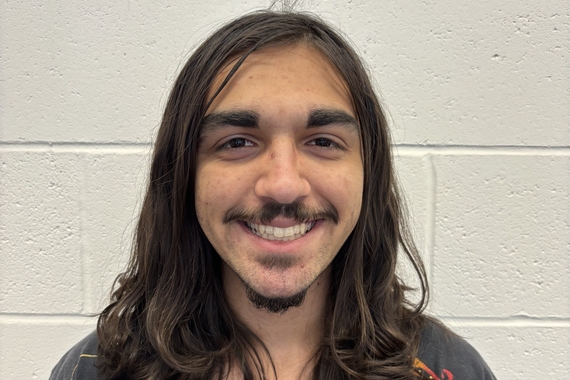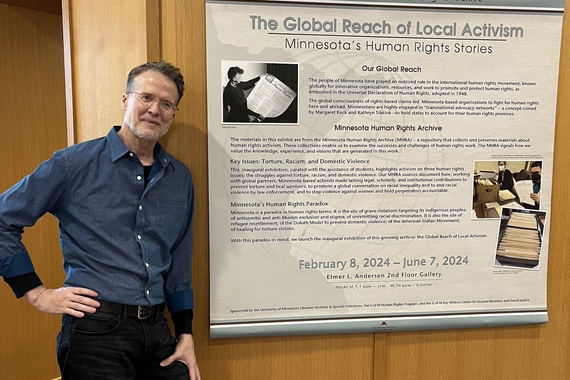20th Anniversary Alumni Reflections: Cameron Mailhot
In celebration of the Human Rights Program's 20th Anniversary, Cameron Mailhot (BA Political Science '16) recently shared with us his reflections on his time with the HRP and the impact it had on his future career path.
Human Rights Program (HRP): What did you do with the Human Rights Program while you were a student at the University of Minnesota?
Cameron Mailhot (CM): I worked at the Human Rights Program for two years, from 2014 to 2016. The work that I did during my time at the Human Rights Program was quite diverse, some of which included keeping the program running smoothly—responding to emails, preparing academic events, organizing the newsletter, and coordinating with other centers/institutes on campus. But perhaps the most enjoyable aspects of my position at the program were those which allowed me to work closely with other students, faculty, and staff on some of the most important human rights issues of our time.
Two related initiatives bookend my time at the program. In September 2014, within a few days of my start at the program, 43 male students from the Ayotzinapa Rural Teachers’ College were disappeared in Iguala, Mexico. This event, of course, was highly publicized and received widespread international attention: vigils and protests spread beyond Mexico to Argentina, the United States, and beyond; government officials condemned the lack of transparency; and human rights organizations called for documentation and justice. To contribute to this global discussion, we at the Human Rights Program organized a series of events and “teach ins” in the weeks thereafter with the explicit purpose of raising awareness of not only this specific atrocity but also the issue of forced disappearances and extrajudicial killings which continue to plague not only Mexico but much of the world today. This commitment continued throughout the years and into the final months of my time at the program. In the summer of 2016, I began to work closely with Director Barbara Frey, then-PhD student Paula Cuellar, and a set of undergraduate researchers to lay the initial groundwork of what would become the Observatory on Disappearances and Impunity in Mexico, a collaborative project with researchers at Oxford and FLACSO-Mexico dedicated to reducing impunity in Mexico by systematically documenting disappearances throughout the country. In this way, my time at the program was committed to promoting not only its duty as an institute for the academic study of human rights but also its identity and role as a hub for human rights practitioners in Minnesota and around the world.
HRP: How did your work with the HRP affect your career path?
grounded in policy-relevant research and translating
the work I do in academic spaces to those who can
stand to benefit the most from it."
CM: Since I was a young teenager, I have wanted to pursue a career in academia as a professor. During my first two years at the University of Minnesota (prior to my time at the HRP), I dedicated myself almost exclusively to the academic aspect of this career: excelling in classes, conducting research, participating in clubs and programs to pad my CV for graduate school, and so forth. While this is still my ultimate career goal, I was surrounded at the HRP by a fantastic team of researchers, faculty, students, and staff on campus and in the broader community constantly committed to bettering the world around them. As a result, I became committed to emulating what they were doing in the work I do. This helped me to develop a broader understanding of the purpose and value of my chosen career path: rather than simply dedicate myself to contributing to the “great debates” in the Ivory Tower, I am more deeply committed today to remaining grounded in policy-relevant research and translating the work I do in academic spaces to those who can stand to benefit the most from it. I know that I would not be so strongly committed to the normative dimensions of academic research as I am now, if I had not spent two years working at and with the HRP.
HRP: What are you doing now?
CM: I am currently a PhD candidate in the Department of Government (Political Science) at Cornell University, where I study the role that the international community plays in rebuilding post-conflict and post-communist societies. While my interests are global, I conduct research on Eastern Europe and the Balkans, in particular. Prior to the COVID-19 Pandemic, I had been conducting for my dissertation archival research, interviews, and two surveys in Kosovo, seeking to understand the effect that the various international missions in the country (the United Nations’ Mission, the European Union’s Mission, etc.) have had on the development of positive peace in the country—namely, positive state-society relations, the commitment to the rule of law, and good governance practices. Unfortunately, I had to return to the United States in March 2020 as a result of the pandemic. While I aim to return to Kosovo when feasibly and ethically possible to finish this research, at the moment I am spending my time now writing up a few chapters of my dissertation and collaborating with various researchers at Cornell and elsewhere on an array of projects around post-conflict transitions. One project, in coordination with a team of researchers at Oxford and the University of North Carolina-Wilmington, examines how the departure of peacekeeping missions from formerly war-torn countries affects their economic, social, and political development; here, we focus on the peacekeeping process which has unfolded in Côte d'Ivoire, Haiti, and Liberia. A second project with a fellow graduate student at Cornell examines how multiple legacies of violence—from wartime violence to structural violence to domestic violence—affect women’s political participation in post-conflict societies.
